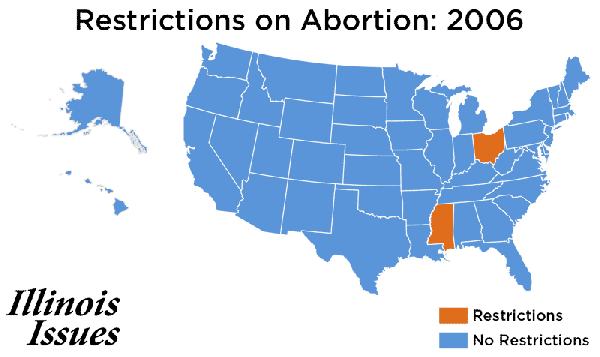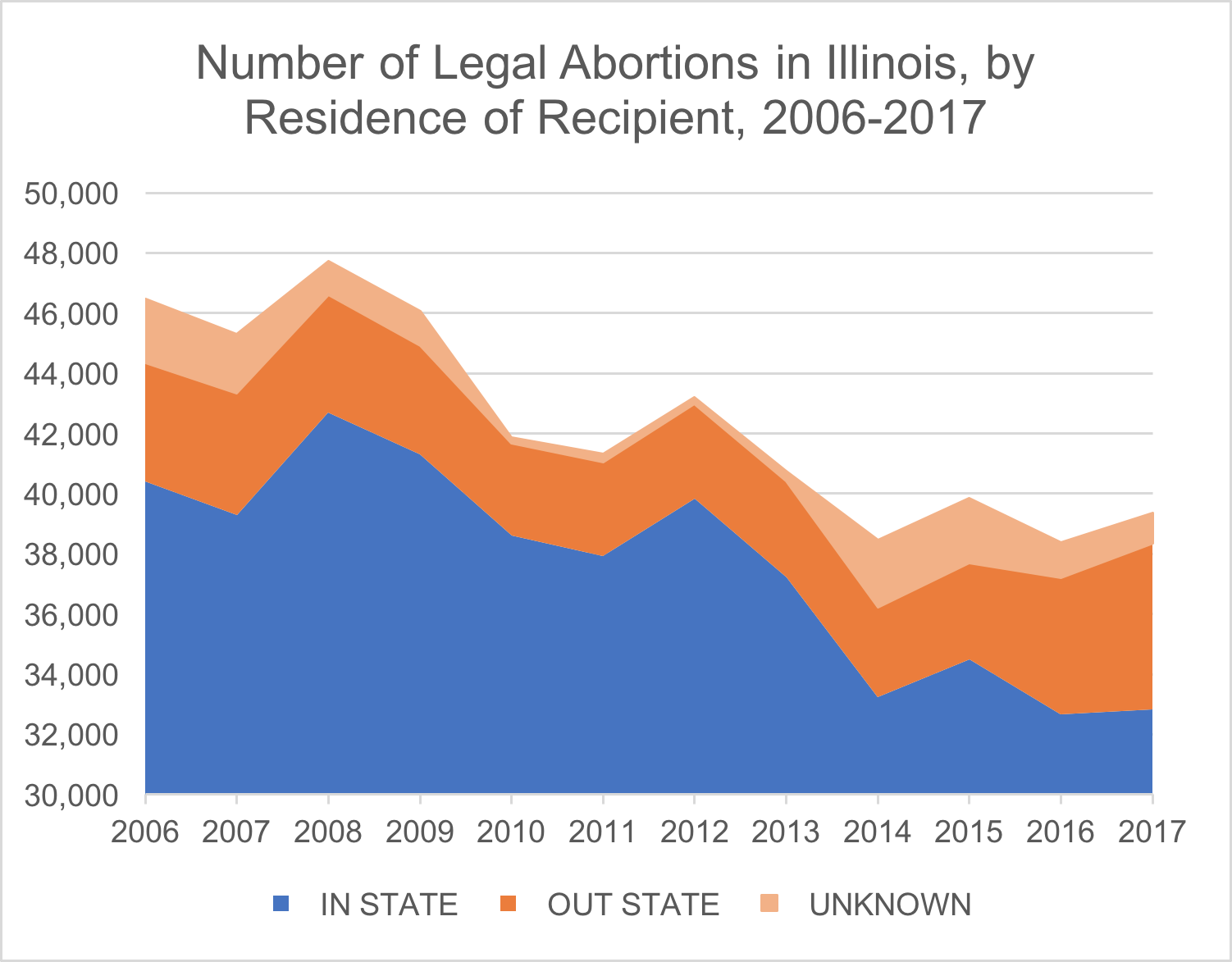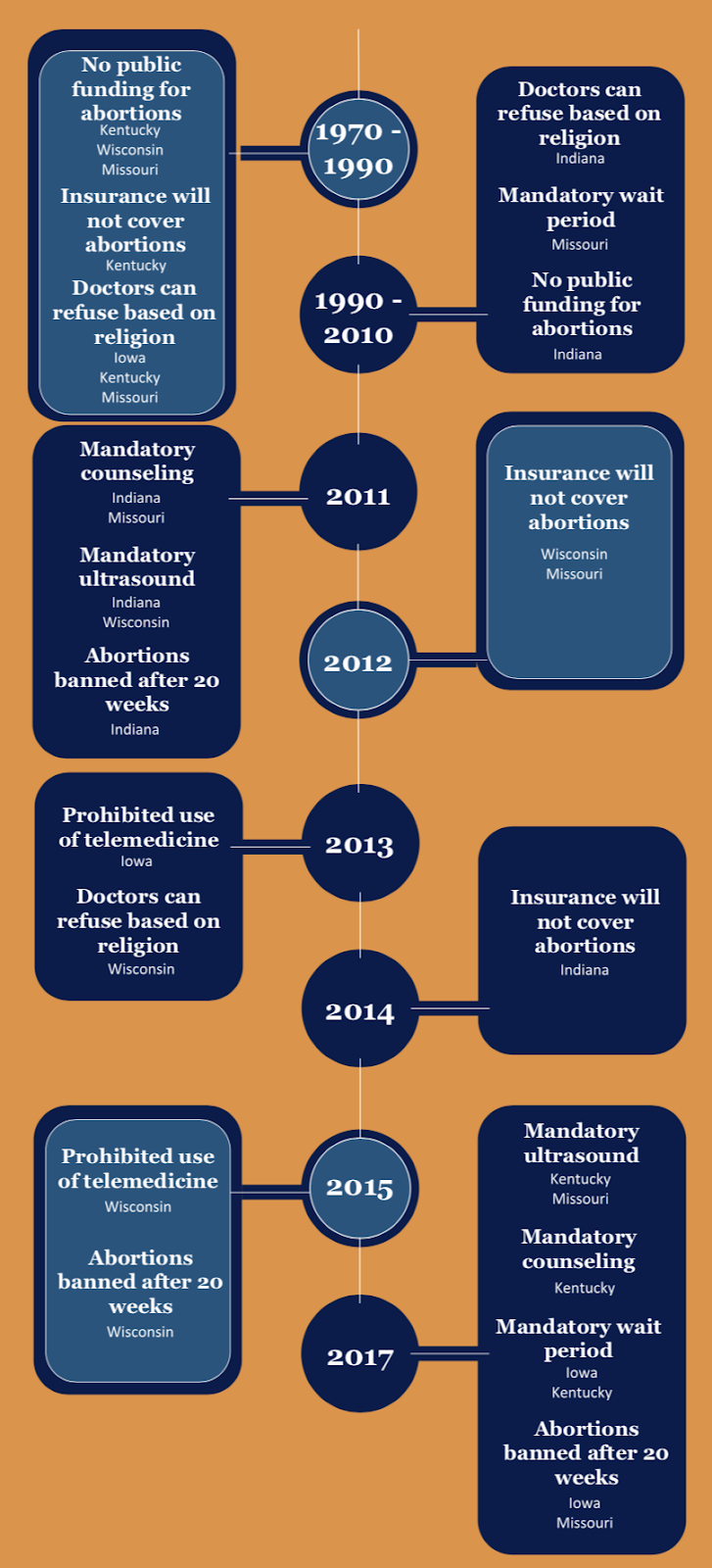Illinois Issues: Abortion Restrictions In Surrounding States Draw Women To Illinois

Data from the Guttmacher Institute Cynthia Buckley and students/Univesity of Illinois Urbana Champaign
Cynthia Buckley says as an Illinois taxpayer, she’s irked each time she runs across a billboard beckoning Illinoisans to move to Indiana.
“I really just get a little angry because we are footing the bill for their denial of women's rights. And that's not fair,’’ she said.
A sociologist and demographer at the University of Illinois at Urbana Champaign, she is working on a project that shows while the number of abortions among Illinois residents is on the decline, those for women coming into Illinois from out of state has risen sharply. In fact, the number of Illinois residents having abortions is below the national average, she says.
The information is based on statistics from the Illinois Department of Public Health and the reproductive rights organization, The Guttmacher Institute. The latter compiled information indicating that the abortion rate nationally in 2017 was the lowest it’s been since the 1973 Roe v. Wade decision, which ruled that state bans on abortion were unconstitutional.

University of Illinois Urbana-Champaign professor Cynthia Buckley.
Illinois has expanded its abortion rights, including state-paid abortions through Medicaid.
Meanwhile, its neighbors — Indiana, Iowa, Missouri and Kentucky —enacted new restrictions like mandatory ultrasounds and requirements on waiting periods and counseling. They also limit the number of weeks at which a pregnancy can be terminated. This year, a wave of states enacted even more restrictive rules. Illinois countered with a new law this spring that makes abortion a fundamental right and requires new private insurers to cover abortions -- if they cover pregnancy.
Cynthia Buckley says while states can put in restrictions, abortion is still a right in the United States. And she is glad women from other states can get to Illinois to exercise that right. “And we have highways and buses and trains and rural roads that do enable women from surrounding states where abortions are very difficult to acquire. They come to Illinois.”
They come by the thousands, she says.
Scholars we talked to for this story saw several reasons for the overall drop in abortions: most pointed to better contraceptives, improved insurance through the Affordable Care Act to cover birth control and a trend in teens choosing to delay having sex until a time when they are more likely to use contraceptives.
But there remains disagreement about whether stepped up anti-abortion efforts and the increase in restrictions have played a role.
Some say Illinois is an outlier as a haven amid harsher attitudes.

Tracey Lewis-Elligan is chairwoman of the sociology department at DePaul University in Chicago.
“Those restricted abortion policies are unevenly played out, depending on where we live,’’ she said. “So the question is, how is that going to impact people's choices in the long term? I think it's really too early to tell.”
Elizabeth Nash is a state policy expert at Guttmacher, which maintains that the restrictions are not the reason for the national overall decline in terminations of pregnancies.
“Abortion restrictions do have an impact certainly in some states, and certainly on the individual level, where a restriction can delay a person from accessing abortion services, make it more difficult to access abortion services, and even keep a person from actually getting services,’’ Nash said. “But those hardships and those burdens aren't necessarily showing up in the rates themselves.”
Logically, she said, if the restrictions explained the drop in abortions, birth rates would increase, and they haven’t.

Others see it differently. That includes Michael New, a business professor at the Catholic University of America who published articles in both scholarly and commercial publications about trends. He said some of the drivers of the decreasing rate include anti-abortion forces getting their message through and existence of pregnancy help centers.
“I just think that numbers fell everywhere, even states that are not passing a lot of pro-life laws. So it's not just restrictions, but I do think there's a good body of research that shows that some pro-life laws do reduce abortion rates,’’ he said.
Research shows that when there's an end to taxpayer funding of abortions, abortion numbers go down, he said.
“I did a study in 2016 on the federal Hyde Amendment, which limits the ability of the federal government to pay for elective abortions through Medicaid, and I found it prevented over 2 million abortions since 1976,’’ he said. “So I do think some pro-life laws are playing a role.”
That’s what upset Buckley, the University of Illinois researcher.
“We are literally and figuratively footing the bill for women's health care in states like Missouri and Iowa and Indiana. Basically we are a great state in a really bad neighborhood for women's reproductive rights.”
Links
- Illinois Issues: Voters Support More Statewide Gun Regulation, Survey Shows
- Illinois Issues: Survey—Voters Diverge On Gov, Economy
- Illinois Issues: Sacred Buildings In An Age of Decline
- Illinois Issues: Alaina Hampton On Life After Speaking Out
- Illinois Issues: Charlie Wheeler On The Past And Future Of Statehouse News
- Illinois Issues: TIF—The Swiss-Army Knife Development Tool

